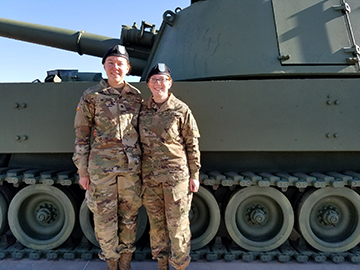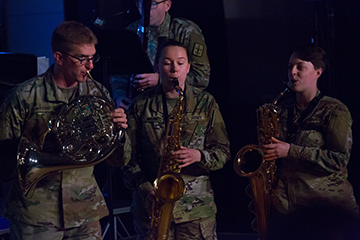COMMTRACKS
Simmons, to the National Guard, and Back
By: Huda Al-Shair
Waiting in the cold, unlit CommLab, Regan Billings Pearce entered and — with her signature radiant smile and positive energy — warmed the atmosphere and lit up the room. Studying Regan and her amiable demeanor while she walked across the room, it was hard to imagine someone as gentle as her participating in such a gritty experience like the National Guard.
However, I quickly learned that Regan has a very tough and resilient side to her. She comes from a family of veterans so she already possesses the qualities needed to survive in the National Guard. But that didn’t make her experiences during the arduous boot camp and the army’s challenging music school any easier.
Regan took a year off after her first two semesters at Simmons to join the National Guard in 2017, committing to train for one weekend a month and two consecutive weeks during the summer. Playing music since fourth grade, she is an E4 in the 195th Maine Army National Guard Band. Her job is to rehearse her music from her unit in Bangor and perform for the community. As a member of the band, she was able to perform across Maine, from Portland to Fort Kent, while maintaining Army standards such as fitness and weapons training. Despite the break in her studies, she was able to complete her media arts major in time to graduate with the class of 2020.

I began the interview by asking Regan how this whole experience helped her personal growth.
“It’s helped so much, it’s almost hard to put into words. What you do in training, you would never ever do in the civilian world. I never would have pushed myself to those limits physically and mentally. There’s so much pressure on you — it’s like a mind game — and I feel like that helped me be a stronger person overall. I feel so much more confident in myself and what I can do in every aspect of my life.”
Regan compared the lack of structure with time management for a college student to a more structured day in the National Guard and explained how that has helped her.
“The experience made my time management skills way better. I had to manage to finish training, go to class, practice and study.”
I decided to ask Regan if this experience has changed her in any way.
“Definitely. It almost made me less patient. Because, things can always be worse. I almost compare what the worst scenario is in my life now compared to what the worst scenario in my life was when I was in training and nothing really seems to compare.”
This response led me to ask her if she feels this experience has changed her in any way that she found to be negative.

“Yes. Obviously when I enlisted I was a lot more patriotic,” she said with a laugh, “and I am now but — I wouldn’t call it negative, I am a lot more jaded in terms of government work because I’ve seen how the system works and — it’s just so bureaucratic — the way that they process things is so unnecessary and I’m kind of sad that I’m not as patient as I was. Sometimes it makes me feel isolated because no one else around me understands the experience.”
Regan’s experience has made her more passionate about changing certain aspects of the government.
“It sobered me to the fact that 18, 17 for some, is so young. I wish the draft age was 21. It was insane seeing kids away from their families and shooting weapons and it’s a lot. The processing and paperwork, the systems that the military and the government is using are so dated, and the training videos that we watched are so old, they’re from like 2002, and they’re all about people that aren’t white European — everyone who looks different than that is “other” and un-American, and that is still being reflected in training videos, and you have these 17-year-old kids watching them — it definitely makes me reflect on what I’ve learned as a comm student.

To close this interview, I asked Regan how this experience has affected her as a student.
“It is insane going from the military to Simmons. It’s pretty much going from like re-learning a completely different language. It’s like yin and yang. Obviously, many of the people in the service who feel the need to serve have a sense of patriotism and a love for their country, and Simmons is — some people feel the opposite of that and with good reason. Some folks are anti-military and anti-veteran, and — I’ve kept my service on the down low because if you tell someone you’re in the National Guard they’ll make an assumption about you. It’s really weird navigating through this space having served.
Made by the 2020 senior communication students at Simmons University